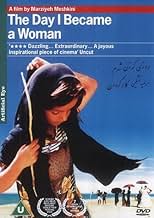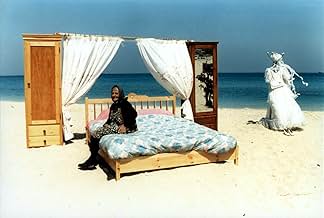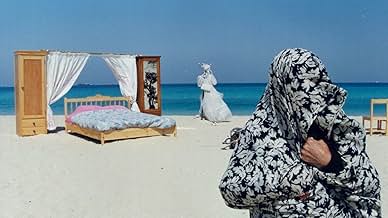VALUTAZIONE IMDb
7,3/10
2088
LA TUA VALUTAZIONE
Aggiungi una trama nella tua linguaThree linked stories show women at life's crossroads: a girl's 9th birthday, a cycling race, and an elderly woman's dream of buying long-desired items.Three linked stories show women at life's crossroads: a girl's 9th birthday, a cycling race, and an elderly woman's dream of buying long-desired items.Three linked stories show women at life's crossroads: a girl's 9th birthday, a cycling race, and an elderly woman's dream of buying long-desired items.
- Regia
- Sceneggiatura
- Star
- Premi
- 10 vittorie e 5 candidature totali
Recensioni in evidenza
Absolutely stunning. On the surface it's a triptych of short stories showing a girl, young wife, and old woman in Iran, but it plays as allegory, and the way it's executed by director Marzieh Meshkini is masterful. She shows great restraint and precision in everything she does, delivering a message with enough ambiguity to make the viewer ponder, and yet clearly showing the constraints of being a woman in a male-dominated society. The middle story in particular was as poetic and profound an expression of the patriarchy as I've ever seen; it was simply breathtaking. This is a film that should be far better known and seen; seek it out.
It was, in some ways, a strange film. Its' use of symbolism, combined with the mystery of incomplete plots gave it a unique look, and oddly made the film better than it probably is. There are folks who won't care much for this film, but I found it a charming and poignant look at the status of women in Islamic nations. How tradition is clashing with changing times.
I liked the first segment best, because of it's sweet sadness. I next like the third segment, because the old lady was quite charming. And though I did like the middle segment, I found it the hardest to follow and understand.
This isn't a great film, but it is a very good one. Technically it's below what I've come to expect from a film, but it conveys it's message well and does so with bittersweet sadness which works well for this film. It may be an Iranian "feminist" movie, but it's worth a look.
I liked the first segment best, because of it's sweet sadness. I next like the third segment, because the old lady was quite charming. And though I did like the middle segment, I found it the hardest to follow and understand.
This isn't a great film, but it is a very good one. Technically it's below what I've come to expect from a film, but it conveys it's message well and does so with bittersweet sadness which works well for this film. It may be an Iranian "feminist" movie, but it's worth a look.
I saw "Roozi khe zan shodam" ("The Day I Became a Woman") a few days ago during the Memorial Day holiday. It was a good film with strong, subtle acting and quite interesting camera shots.
In a nutshell, the film is about women in contemporary Iran. It depicts compelling accounts about a girl who has just turned nine and is now therefore considered to be a woman and expected to leave childhood play behind; a woman's bicycle race and the strong objection a husband has to his wife's participation; and an elderly woman who has in earlier life deferred her desires to buy consumer goods and finally has the opportunity to realize her spending dreams.
Without having lived in or even visited Iran, I can't judge the realism of "Roozi khe zan shodam". The camera offers us an innocent, child-like eye, just observing these characters and leaving us to draw our own conclusions. I particularly enjoyed the cinematography of the mass of women cyclists, all clad in black practically head to foot, pedaling away almost entirely in silence except for the rhythmic pedaling noises; and the parallel shots focusing on the legs of the galloping horses, carrying the complaining husband and his cohorts. The pedaling wife Ahoo (Shabnam Tolui) never speaks a word, but her focused and desperate efforts indicate her quest for increased independence. I also enjoyed following the activities of 9-year-old Hava (Fatemeh Cherag Akhar).
I would see "Roozi khe zan shodam" again for its cinematography and the unique (at least for Western audiences) life experiences depicted. It's by no means Hollywood fare or even overtly feminist, but allows the viewer to settle in for a bit of (realistic or stylized?) local color and look at perspectives there of women in three different stages in their lives.
In a nutshell, the film is about women in contemporary Iran. It depicts compelling accounts about a girl who has just turned nine and is now therefore considered to be a woman and expected to leave childhood play behind; a woman's bicycle race and the strong objection a husband has to his wife's participation; and an elderly woman who has in earlier life deferred her desires to buy consumer goods and finally has the opportunity to realize her spending dreams.
Without having lived in or even visited Iran, I can't judge the realism of "Roozi khe zan shodam". The camera offers us an innocent, child-like eye, just observing these characters and leaving us to draw our own conclusions. I particularly enjoyed the cinematography of the mass of women cyclists, all clad in black practically head to foot, pedaling away almost entirely in silence except for the rhythmic pedaling noises; and the parallel shots focusing on the legs of the galloping horses, carrying the complaining husband and his cohorts. The pedaling wife Ahoo (Shabnam Tolui) never speaks a word, but her focused and desperate efforts indicate her quest for increased independence. I also enjoyed following the activities of 9-year-old Hava (Fatemeh Cherag Akhar).
I would see "Roozi khe zan shodam" again for its cinematography and the unique (at least for Western audiences) life experiences depicted. It's by no means Hollywood fare or even overtly feminist, but allows the viewer to settle in for a bit of (realistic or stylized?) local color and look at perspectives there of women in three different stages in their lives.
I felt the need to defend this film as I don't believe it deserves the above rant. It is true that we are not given many details about the three characters whose stories are presented. But we are given enough to feel sympathy for the girl whose childhood is over, the woman who just wants to be allowed to ride her bike, and the woman who was finally able to buy the things she's always wanted. The English title evokes an expectation that each of these stories represents a transition.
As a woman, it sometimes occurs to me to wonder what that means exactly. This film explores the fact of being a woman and what it means to become one. Was Hoora not a woman before today? We are left to imagine what her life was like before and what brought her to this circumstance, but clearly these details are not so important.
This film is an exploration, not a documentary. It is beautiful and bittersweet (and personally I liked the music) It is not Hollywood by any standard but it is not complicated and even to a Westerner like me it held a lot of truth. It's purpose can be as much to explore one's own views as those of the Iranian filmmaker, and should be viewed as a piece of art rather than a mainstream American movie. Give it a chance, it's only 74 minutes.
As a woman, it sometimes occurs to me to wonder what that means exactly. This film explores the fact of being a woman and what it means to become one. Was Hoora not a woman before today? We are left to imagine what her life was like before and what brought her to this circumstance, but clearly these details are not so important.
This film is an exploration, not a documentary. It is beautiful and bittersweet (and personally I liked the music) It is not Hollywood by any standard but it is not complicated and even to a Westerner like me it held a lot of truth. It's purpose can be as much to explore one's own views as those of the Iranian filmmaker, and should be viewed as a piece of art rather than a mainstream American movie. Give it a chance, it's only 74 minutes.
On the surface this film tells three simple stories, but its simplicity is deceiving. Each story tells an episode in the life of a woman but as the woman ages the stories become more and more surreal. In so doing Marzieh Meshkini is making a parallel with the life of Iranian women.
Lo sapevi?
- QuizMarzieh Makhmalbaf's directorial film debut.
- BlooperIn the first sequence, the lollipop that Hava and Hassan pass between them grows and shrinks in size without regard to the passage of time.
- Citazioni
Grandmother: Will you promise to be back by noon?
Hava: I promise!
Grandmother: God won't forgive you if you lie. Don't be late.
- ConnessioniFeatured in Women Make Film: A New Road Movie Through Cinema (2018)
I più visti
Accedi per valutare e creare un elenco di titoli salvati per ottenere consigli personalizzati
Dettagli
- Data di uscita
- Paese di origine
- Siti ufficiali
- Lingua
- Celebre anche come
- The Day I Became a Woman
- Luoghi delle riprese
- Kish Island, Iran(location)
- Aziende produttrici
- Vedi altri crediti dell’azienda su IMDbPro
Botteghino
- Budget
- 180.000 USD (previsto)
- Lordo Stati Uniti e Canada
- 149.971 USD
- Fine settimana di apertura Stati Uniti e Canada
- 48.255 USD
- 8 apr 2001
- Lordo in tutto il mondo
- 149.971 USD
Contribuisci a questa pagina
Suggerisci una modifica o aggiungi i contenuti mancanti



















